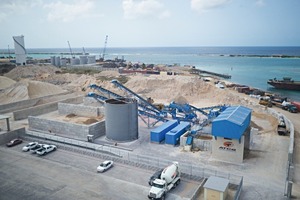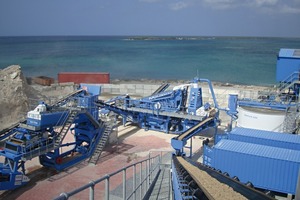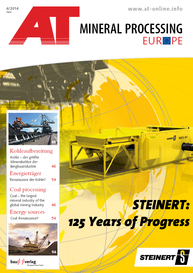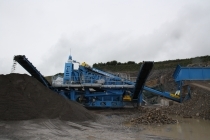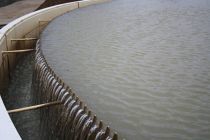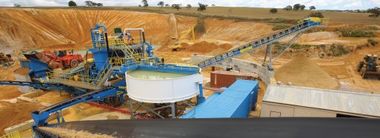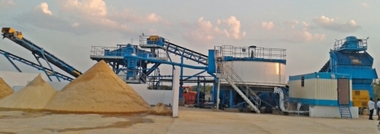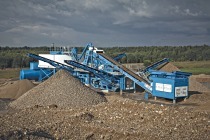Preventative maintenance from CDE
Located on the island of Aruba, off the coast of Venezuela ATCO Concrete Products have recently taken ownership of a turnkey C&D waste recycling plant from CDE Global to process construction and demolition waste for use in concrete production (Fig. 1). The ever-increasing demand for construction materials on the island of Aruba led to a dramatic increase in production and thus ATCO had to become more efficient than ever. ATCO took the opportunity to set up the first ready mix facility on the island, supplying a large proportion of the market.
The addition of the washing plant from CDE paves the way for future growth and increased efficiencies with the production of 2 no. washed recycled aggregates (5-10 mm, 10-20 mm) and also 1 no. washed recycled sand at -5 mm. The modular Construction & Demolition waste recycling plant on site is comprised of an M2500 E3, an AggMax 82R, a RotoMax RX80 an AquaCycle A200, a GHT Overhead Beam Filter Press and 3 no. S3008 stockpile conveyors (Fig. 2) processing a variety of raw feed material up to a rate of 110 t/h.
The Processing System
The CDE recycling plant at ATCO includes a number of treatment phases including the initial feeding system, the attrition phase which scrubs the aggregate product and removes unwanted contaminants, the aggregate screening and stockpiling system, a sand washing phase which produces one washed recycled sand product, a primary stage water treatment phase and a sludge management system. The raw feed material is delivered to the M2500 via an R15 feed hopper and tipping grid at a maximum rate of 100 t/h which is fitted with a 150 mm screening grid. The integrated belt feeder then transfers the material directly onto an inclined transfer conveyor which features an integrated overband magnet for the effective removal of any ferrous material which can then be discharged into an underlying skip.
The material from the conveyor is then transferred onto the ProGrade rinsing screen for first phase of washing and screening. The P2-75 screen is designed to cope with the harshest of materials and features polyurethane matts on the top and bottom deck to ensure precise and efficient screening with high resistance to abrasion. The top deck aperture is split into two sizes, the first 2 m is designed to screen material at 10 mm with the last 3 m designed to screen material at 22.5 mm. Individual spray bars work to wash the material, with the +22.5 mm aggregates from the top deck being sent to an oversize stockpile via an inclined conveyor. Meanwhile, the +10 mm material is washed and screened before being directly sent to a transfer conveyor prior to entering the AggMax 82R.
In the interim, material on the bottom deck is screened for material at 2.5 mm, which following the screening and washing of the smaller aggregate is then moved along to a transfer conveyor and subsequently fed into the AggMax. The AggMax 82R attrition system integrates pre-screening, the RotoMax R80 attrition system, a trash screen for the removal of contaminants and an EvoScreen dewatering screen for post-attrition rinsing of the scrubbed material on one single chassis.
Designed specifically for heavy, clay bound material; the aggregates within the RotoMax are subject to severe attrition to ensure that the highest level of clay is removed. The high level of attrition is effectively achieved through the use of 138 individual blades mounted on shafts which are manufactured from chrome molybdenum steel for high strength and durability. Maximum attrition is further enhanced through the counter rotation of blades on two separate shafts which merge with each other to ensure the maximum amount of attrition.
Following the scrubbing process the clean aggregate is discharged onto the secondary rinsing screen, which de-waters the aggregate ready for further screening. At the rear of the AggMax a trash screen has been integrated for the efficient removal of lightweight contaminants. All sand fractions and water are piped back to the M2500 cyclone to ensure maximum sand recovery.
On the top deck of the AggMax sizing screen, the material is passed directly through to a double deck rinsing screen featuring polyurethane matts. The top deck aperture is 10-20 mm with the bottom deck aperture being 5-10 mm. The 10-20 mm material is fed onto a side conveyor and stockpiled while the 5-10 mm material is sent to another side conveyor for stockpiling. All other material will fall through to the sump and is then pumped back to the M2500 to ensure maximum sand recovery.
Water Treatment
The first stage of the water treatment process involves the AquaCycle A200 high rate thickener system. This unit comes with a fully automatic polyelectrolyte dosing unit and AquaStore water storage and pumping system. The waste water from the processing plant which also contains the minus 63 µm material, is sent to the AquaCycle unit through the discharge point at the top of the EvoWash cyclone. The first dose of polyelectrolyte is given within a de-aeration chamber located at the side of the circular thickener tank. This removes air before it enters the 400 m3/h capacity tank thus ensuring effective settling of the material. The polyelectrolyte has the effect of forcing the minus 63 µm particles to join together and fall to the bottom of the tank where the integrated scraper ensures the sludge maintains an even consistency.
Meanwhile, the clean water overflows the top of the thickener tank via the peripheral weir and the water is then sent to the AquaStore system for recirculation around the washing plant. When the sludge is ready to be discharged a signal is sent to the PLC controls which engage the sludge pump. The conditioned sludge from the AquaCycle is then sent to a large concrete buffer tank where it is stored before being sent to the final stage of sludge management, the GHT Filter Press. This eliminates the requirement for settling ponds to store waste water from the plant while maximising water recycling and reducing health and safety risks on site. The filter press is a plate press which effectively delivers filter cakes with over 90 % of dry solids content, recycling more than 90 % of the water use.
Project Management
With the remote location of the ATCO site, on-going support was a key issue for consideration at the outset of the project. The CDE Project Management process ‘ProMan’, allowed ATCO to be closely involved from the initial design stage, through to manufacturing, logistics, installation, commissioning and beyond. Project Manager Brian McCullough explains: “With all projects that we deliver, internally within the company, we appoint a dedicated Single Point of Contact for our customer which allows them to have continuous contact throughout the entire duration of project delivery. The ProMan system enabled us to communicate regularly and effectively with ATCO and they were assured that the plant would meet the specifications agreed”.
After Sales Service
Following installation of the plant, ATCO invested in a Preventative Maintenance Programme which sees a CDE engineer with full knowledge about plant history regularly reporting and recommending maintenance action, in order to maintain plant performance at the optimum level. Through the Preventative Maintenance Programme ATCO will avail of a comprehensive on-site plant inspection every 2 months regardless of operating hours or throughput levels. This service programme includes recalibrations of the plant if required, a written report detailing the condition of the plant and recommendations for any work that may be required to ensure the plant is operating at the optimum level. The Preventative Maintenance Inspections have a proven impact on plant production levels and will provide ATCO with visibility of expenditure through a fixed cost agreement.
ATCO have also taken delivery of a CDE Workspace in conjunction with their tailored Preventative Maintenance agreement. The CDE Workspace is a secure site storage cabin which contains a workbench, racking for common fixings, shelving space and hooks for common parts and tools. CDE Global CustomCare Manager Martin Jackson comments: “Regular inspections of the plant will give us and the customer a detailed understanding of how the plant is performing and ensure that efficiencies are maintained throughout. This proactive approach to maintenance will reduce cost for ATCO by maximising production uptime and ensuring that they get the best value from their CDE plant in terms of both throughput levels and quality end products.”

